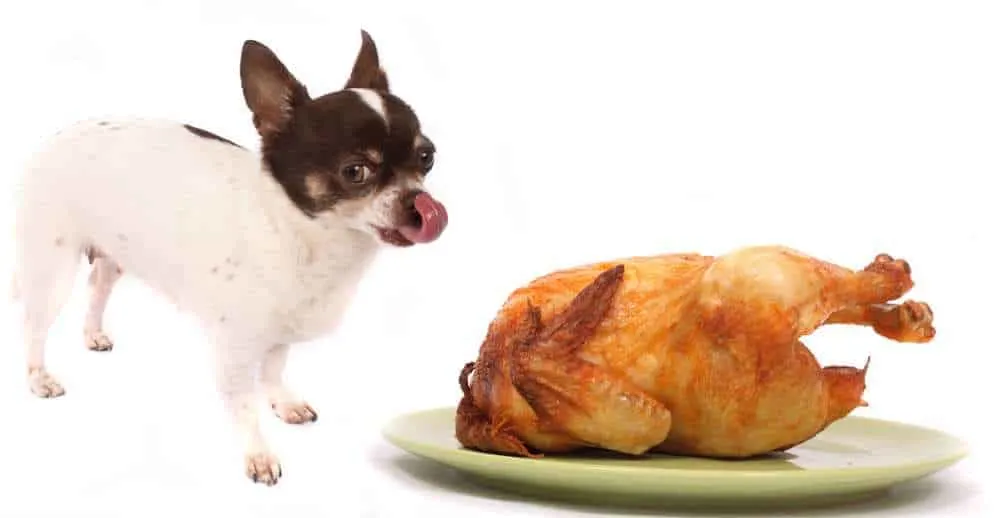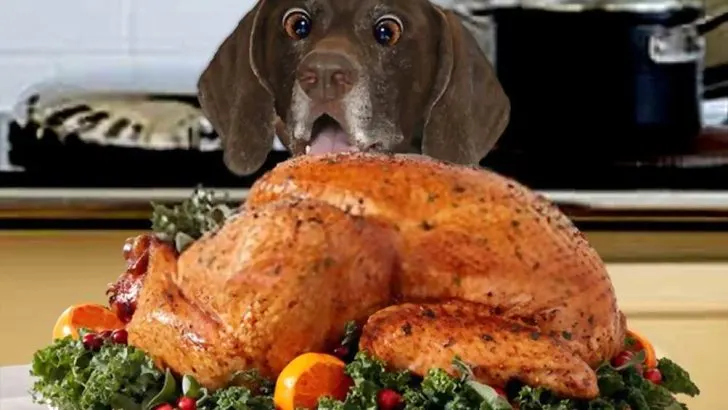Can dogs eat turkey? At first glance, this seems like a loaded question.
After all, if you’ve ever watched a dog happen upon an unattended portion of turkey, you know for a fact that yes, dogs can indeed eat turkey!
So perhaps a more pressing question is, should dogs eat turkey?
Is turkey good for dogs? Is it something dogs should eat occasionally or regularly? Are there any side effects to watch out for? Can dogs have a food allergy to turkey?
These are the questions we will explore together in this article. By the time you finish reading, you will know whether the turkey is food your dog can safely eat.

Is Turkey Toxic To Dogs?
The short answer to this question is “no.” Turkey is not toxic to dogs. But there is a deeper answer to this question that many dog owners forget to think about.
Take Thanksgiving, for instance.
Can Dogs Have Thanksgiving Turkey?
As the American Kennel Club (AKC) points out, for one day each year, the entire nation becomes collectively obsessed with turkey.
Then, for weeks afterward, people are trying everything they can think of to get rid of all that leftover turkey….including feeding it to their dogs!
But “people” turkey often contains other ingredients besides just plain turkey. Butter, salt, stuffing, garlic, pepper, spices – many of these ingredients can be digestively upsetting or even toxic to your pup.
Pancreatitis, a severe and potentially life-threatening inflammation of the pancreas, is more common around the holidays when the fat content in many pet dogs’ diets goes up.
If you are going to feed your dog “people” turkey, make sure it is plain, plain, plain.
The AKC offers this guidance if you want to feed holiday turkey to your dog:
- Take the skin off.
- Remove ALL the bones (cooked bones can be deadly).
- Offer white meat only if your dog is overweight (white meat is lower in fat).
- Feed only small treat-sized portions.
An even better alternative is to find another treat to offer your dog during the holidays, such as plain turkey that is prepared specifically for dogs. You might enjoy preparing this turkey treat recipe from the Canine Journal.
Can Dogs Eat Deli Turkey?
Deli-style turkey slices make preparing lunches and snacks so easy!
And turkey hotdogs – well, what’s not to like about those tasty morsels!
But while you may eat, enjoy and digest these delicacies without any problem, your dog may not be so lucky.
As Canine Journal points out, many deli-style types of meat made for people include chemicals, additives, flavor agents, preservatives, and even spices and seasoning that can make dogs sick.
So while it may be tempting to offer your salivating pooch a slice of meat out of your turkey sandwich, it is safer to resist.

Does Turkey Have Any Nutritional Value To Dogs?
The next question then becomes, if the plain turkey is not toxic to dogs, is there anything good about it?
In other words, does turkey contain any good nutrients that may be beneficial to dogs?
The answer here is a solid “yes.”
Turkey actually contains several nutrients that are beneficial for canines. Dark turkey meat has more nutrients overall, but it also has more calories and more fat.
So if your dog is overweight or simply needs to watch caloric or fat intake, it can be a smarter choice to feed only white meat instead.
Protein
According to PetMD, turkey is a lean protein source that can help your dog build and maintain important muscle mass.
When you see dog foods and treats that contain turkey meals, this is basically pure protein.
Turkey also contains a wealth of vitamins and minerals that are important to your dog, according to Dogs Naturally Magazine.
Calcium
Calcium is essential for bone and tooth growth and can prevent muscle cramping. It is also an important mineral for heart regulation.
Magnesium
Magnesium can be an important component in preventing the formation of kidney stones. It is also very important for cardiovascular health.
Manganese
Manganese helps the body produce collagen, which in turn helps improve skin health and promote strong healthy muscles, tendons, and ligaments.
Phosphorus
Phosphorus helps to keep bones and teeth healthy and strong promotes healthy kidney function and helps keep heart rate regulated. Phosphorus is also important for nervous system function.
B2 (Riboflavin)
B2 supports normal red blood cell formation and aids in growing healthy skin, hair, and nails. In dogs that are genetically prone to cataracts, riboflavin can be an especially important dietary addition.
Potassium
Potassium is incredibly important for heart and nervous system function. Most importantly, potassium is an electrolyte that aids in water balance and water absorption by the cells.
B12
B12 guards against anemia and helps to promote healthy digestion and mental focus.
B6
The B6 in turkey can help your dog fight off allergies and asthma, arthritis, and kidney stones. It can also help your dog absorb the nutrients in protein and fat.
Selenium
Turkey is also a good source of selenium, which helps to regulate the thyroid gland, supports immune system function, and can promote healthy prostate in male dogs.
Zinc
Zinc deficiency is becoming more and more common in dogs and can cause a range of worrisome health problems. Turkey is a great source of zinc, which helps the body heal, promotes proper oil gland production to keep skin and coat healthy, and boosts the immune system.
So as you can see, there is a lot of good stuff packed into plain, skin-less, bone-less turkey meat.

Can Dogs With Food Allergies Eat Turkey?
Canine food allergies are becoming more and more common today. There are a variety of reasons for this rise in dogs with food allergies.
One reason is that some purebred dogs with more limited gene pools are less hardy and may even pass along genes that predispose puppies to food allergies.
Another reason is because of how food livestock is raised today. Using organic protein sources that have not been given hormones or antibiotics can help reduce the likelihood your dog won’t be able to tolerate food.
And sometimes dogs are simply sensitive to or allergic to poultry. As WebMD-Pets points out, chicken is the poultry that most dogs are allergic to. But some dogs can be allergic to turkey too.
What are some signs to watch for that indicate your dog is allergic to turkey? WebMD-Pets lists these warning signs:
- Itching and scratching.
- Shaking their head.
- Gas, diarrhea, constipation.
- Scooting their rear end along the ground.
- Rubbing their ears.
- Licking their paw pads and paws.
Just because your dog has never had a food allergy to turkey in the past does not necessarily mean this will never happen. WebMD-Pets states that this is becoming a lot more common today.

Should Dogs Eat Turkey?
So now you know that dogs can eat turkey and that turkey, when prepared properly, can have some important nutritional benefits for your dog.
But does this mean your dog should eat turkey?
Your dog could go their whole life and never eat turkey and that would be okay. It isn’t necessary to feed your dog turkey as long as you are providing all of the necessary nutrients for your dog’s age, gender, and life stage in some other way.
Plain turkey is a good protein alternative to try if your dog happens to be sensitive to chicken or other protein sources. Sometimes dogs that are allergic to chicken can still eat turkey without any problem.
As we mentioned here earlier, white meat turkey in particular is a great protein choice for dogs that are overweight or who are prone to kidney or heart issues and need a regular source of lean protein.
The best way to find out if your dog tolerates turkey well is to offer plain white meat skin-less bone-less turkey in very small portions and then wait 24 hours and watch to see how your dog reacts.
If you don’t see any signs of a food allergy and elimination is normal, this is a good indication your dog can eat turkey safely.
Learn More: What Can Dogs Eat? A Comprehensive List Of Dog-safe Foods


